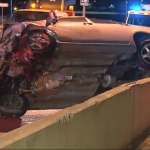Drive Responsibly this Carnival Season
We have much to be thankful for in South Louisiana. We just celebrated the beginning of a New Year and now we are headed into an exciting NFL playoff season with the New Orleans Saints as a serious contender. Mardi Gras falls on Tuesday, March 5 and there are beaucoup Carnival balls and parties leading up to the Fat Tuesday celebration.
Play it safe while partying and be a responsible driver. The automobile accident personal injury attorneys at the law firm of Joseph Joy and Associates have come to the aid of many clients who have suffered injuries at the hands of reckless, negligent and even drunk drivers.
Follow the rules of the road and don’t drink and drive. Designate a driver or call a taxi, Uber or Lyft if you need transportation. According to Mother’s Against Drunk Driving, 78% people agree that their friends are less likely to drive drunk with options like Uber or Lyft.
With more than a month left to go before Mardi Gras, Louisiana State Police are already seeing an increase in drunk driving arrests. You can expect that state and local police will be monitoring the roadways late at night and in the early morning hours in an attempt to clamp down on drunk driving offenses.
The penalties for driving while intoxicated in Louisiana are harsh. Louisiana Revised Statute 14:98 imposes penalties when a driver’s blood alcohol content is measured at .08 or greater or if the driver is under the influence of a controlled dangerous substance. The penalties increase after a driver’s first DWI. It becomes a felony as opposed to a misdemeanor upon the third DWI conviction.
Lafayette television station KLFY reported that Louisiana State Police Troop D made 11 drunk driving arrests last weekend. And, according to the CDC, in a span of nine years, 3,046 people were killed in car crashes involving a drunk driver in Louisiana. The death rate for people killed in crashes involving a drunk driver in Louisiana is higher than the national average.
The personal injury attorneys at Joseph Joy and Associates cannot emphasize it enough: drive defensively. Loss of life and personal injury is the ultimate price to pay for accidents involving a drunk driver. At Joseph Joy and Associates, our personal injury attorneys have recovered millions for clients and their families who have suffered damages due to someone else’s fault. If you have the unfortunate experience of being seriously injured in an accident involving a car, truck or big rig, give us a call: 337-232-8123 or visit us at 900 S. College Rd., Ste. 204, Lafayette, LA.
La. R.S. 14:98 Operating a vehicle while intoxicated
A.(1) The crime of operating a vehicle while intoxicated is the operating of any motor vehicle, aircraft, watercraft, vessel, or other means of conveyance when any of the following conditions exist:
(a) The operator is under the influence of alcoholic beverages.
(b) The operator’s blood alcohol concentration is 0.08 percent or more by weight based on grams of alcohol per one hundred cubic centimeters of blood.
(c) The operator is under the influence of any controlled dangerous substance listed in Schedule I, II, III, IV, or V as set forth in R.S. 40:964.
(d)(i) The operator is under the influence of a combination of alcohol and one or more drugs that are not controlled dangerous substances and that are legally obtainable with or without a prescription.
(ii) It shall be an affirmative defense to any charge under this Subparagraph that the label on the container of the prescription drug or the manufacturer’s package of the drug does not contain a warning against combining the medication with alcohol.
(e)(i) The operator is under the influence of one or more drugs that are not controlled dangerous substances and that are legally obtainable with or without a prescription.
(ii) It shall be an affirmative defense to any charge under this Subparagraph that the operator did not knowingly consume quantities of the drug or drugs that substantially exceed the dosage prescribed by the physician or the dosage recommended by the manufacturer of the drug.
(2) A valid driver’s license shall not be an element of the offense, and the lack thereof shall not be a defense to a prosecution for operating a vehicle while intoxicated.
B.(1) This Subsection shall be cited as the “Child Endangerment Law”.
(2) When the state proves, in addition to the elements of the crime as set forth in Subsection A of this Section, that a minor child twelve years of age or younger was a passenger in the motor vehicle, aircraft, watercraft, vessel, or other means of motorized conveyance at the time of the commission of the offense:
(a) Except as provided in Subparagraphs (b) and (c) of this Paragraph, the execution of the minimum mandatory sentence provided by R.S. 14:98.1 or 98.2, as appropriate, shall not be suspended.
(b) Notwithstanding any provision of law to the contrary, if imprisonment is imposed pursuant to the provisions of R.S. 14:98.3, the execution of the minimum mandatory sentence shall not be suspended.
(c) Notwithstanding any provision of law to the contrary, if imprisonment is imposed pursuant to the provisions of R.S. 14:98.4, the execution of the minimum mandatory sentence shall not be suspended.
C.(1) For purposes of determining whether a defendant has a prior conviction for a violation of this Section, a conviction under any of the following shall constitute a prior conviction:
(a) R.S. 14:32.1, vehicular homicide.
(b) R.S. 14:32.8, third degree feticide.
(c) R.S. 14:39.1, vehicular negligent injuring.
(d) R.S. 14:39.2, first degree vehicular negligent injuring.
(e) A law of any state or an ordinance of a municipality, town, or similar political subdivision of another state that prohibits the operation of any motor vehicle, aircraft, watercraft, vessel, or other means of conveyance while intoxicated, while impaired, or while under the influence of alcohol, drugs, or any controlled dangerous substance, or as otherwise provided by R.S. 13:1894.1.
(2) The determination under this Subsection shall be made by the court as a matter of law.
(3) For purposes of this Section, a prior conviction shall not include a conviction for an offense under this Section, a conviction for an offense under R.S. 14:39.1, or a conviction under the laws of any state or an ordinance of a municipality, town, or similar political subdivision of another state which prohibits the operation of any motor vehicle, aircraft, watercraft, vessel, or other means of conveyance while intoxicated, while impaired, or while under the influence of alcohol, drugs, or any controlled dangerous substance, or as otherwise provided by R.S. 13:1894.1, if committed more than ten years prior to the commission of the crime for which the defendant is being tried, and such conviction shall not be considered in the assessment of penalties in this Section. However, periods of time during which the offender was awaiting trial, under an order of attachment for failure to appear, or on probation or parole for an offense described in this Paragraph, or periods of time during which an offender was incarcerated in a penal institution in this or any other state for any offense, including an offense described in Paragraph (1) of this Subsection, shall be excluded in computing the ten-year period.
D.(1) On a conviction of a first offense violation of the provisions of this Section, notwithstanding any other provision of law to the contrary, the offender shall be sentenced under the provisions of R.S. 14:98.1.
(2)(a) Except as provided by Subparagraph (b) of this Paragraph, on a conviction of a second offense violation of the provisions of this Section, notwithstanding any other provision of law to the contrary and regardless of whether the second offense occurred before or after the first conviction, the offender shall be sentenced under the provisions of R.S. 14:98.2.
(b) If the conviction of a second offense violation of the provisions of this Section when the first offense was for the crime of vehicular homicide in violation of R.S. 14:32.1, third degree feticide in violation of R.S. 14:32.8, or first degree vehicular negligent injuring in violation of R.S. 14:39.2, the offender shall be sentenced under the provisions of R.S. 14:98.2(D).
(3) On a conviction of a third offense violation of the provisions of this Section, notwithstanding any other provision of law to the contrary and regardless of whether the offense occurred before or after an earlier conviction, the offender shall be sentenced under the provisions of R.S. 14:98.3.
(4) On a conviction of a fourth or subsequent offense violation of the provisions of this Section, notwithstanding any other provision of law to the contrary and regardless of whether the fourth or subsequent offense occurred before or after an earlier conviction, the offender shall be sentenced under the provisions of R.S. 14:98.4.
- The legislature hereby finds and declares that conviction of a third or subsequent offense of operating while intoxicated is presumptive evidence of the existence of a substance abuse disorder that poses a serious threat to the health and safety of the public. Further, the legislature finds that there are successful treatment methods available for treatment of addictive disorders.
F.(1) On a third or subsequent conviction of operating while intoxicated pursuant to this Section, in addition to any other sentence, the court shall order, upon motion of the prosecuting district attorney, that the vehicle being operated by the offender at the time of the offense be seized and impounded, and be sold at auction in the same manner and under the same conditions as executions of writs of seizure and sale as provided in Book V, Title II, Chapter 4 of the Code of Civil Procedure.
(2) The vehicle shall be exempt from sale if it was stolen, or if the driver of the vehicle at the time of the violation was not the owner and the owner did not know that the driver was operating the vehicle while intoxicated. If this exemption is applicable, the vehicle shall not be released from impoundment until such time as towing and storage fees have been paid. In addition, the vehicle shall be exempt from sale if all towing and storage fees are paid by a valid lienholder.
(3) If the district attorney elects to forfeit the vehicle, he shall file a written motion at least five days prior to sentencing, stating his intention to forfeit the vehicle. When the district attorney elects to forfeit the vehicle, the court shall order it forfeited.
(4) The proceeds of the sale shall first be used to pay court costs and towing and storage costs, and the remainder shall be allocated as follows:
(a) Sixty percent of the funds shall go to the arresting agency.
(b) Twenty percent of the funds shall go to the prosecuting district attorney.
(c) Twenty percent of the funds shall go to the Louisiana Property and Casualty Insurance Commission for its use in studying ways to reduce drunk driving and insurance rates.
G.(1) If an offender placed on probation for a conviction of a violation of this Section fails to complete the required substance abuse treatment, or fails to participate in a driver improvement program, or violates any other condition of probation, including conditions of home incarceration, his probation may be revoked, and he may be ordered to serve the balance of the sentence of imprisonment, without credit for time served under home incarceration.
(2) If the offender is found to be in violation of both the terms of his release for good behavior by the Department of Public Safety and Corrections, committee on parole, and in violation of his probation by the court, then the remaining balance of his diminution of sentence shall be served first, with the previously suspended sentence imposed by the court to run consecutively thereafter.
Amended by Acts 1991, No. 83, §1; Acts 1991, No. 454, §1; Acts 1992, No. 69, §1; Acts 1992, No. 679, §1; Acts 1992, No. 697, §1; Acts 1993, No. 247, §1, eff. June 2, 1993; Acts 1993, No. 403, §1; Acts 1993, No. 669, §1, eff. June 21, 1993; Acts 1994, 3rd Ex. Sess., No. 20, §1; Acts 1995, No. 316, §1, eff. June 16, 1995; Acts 1995, No. 520, §1; Acts 1997, No. 1296, §2, eff. July 15, 1997; Acts 1998, 1st Ex. Sess., No. 4, §1; Acts 1999, No. 1292, §1; Acts 2000, 1st Ex. Sess., No. 81, §1, eff. April 17, 2000; Acts 2000, 1st Ex. Sess., No. 139, §1; Acts 2001, No. 781, §1, eff. Sept. 30, 2003; Acts 2001, No. 1163, §2; Acts 2003, No. 535, §1; Acts 2003, No. 752, §1, eff. Sept. 30, 2003; Acts 2004, No. 762, §1; Acts 2005, No. 497, §1; Acts 2007, No. 227, §1; Acts 2008, No. 161, §1; Acts 2008, No. 451, §2, eff. June 25, 2008; Acts 2008, No. 640, §1; Acts 2010, No. 801, §1, eff. June 30, 2010; Acts 2012, No. 547, §1, eff. June 5, 2012; Acts 2012, No. 571, §1; Acts 2013, No. 388, §2, eff. June 18, 2013; Acts 2014, No. 175, §1; Acts 2014, No. 385, §1, eff. Jan. 1, 2015; Acts 2014, No. 386, §1, eff. May 30, 2014; Acts 2018, No. 130, §2.
Loss of life and personal injury is the ultimate price to pay for vehicular accidents. At Joseph Joy and Associates, our personal injury attorneys have recovered millions for clients and their families who have suffered damages due to someone else’s negligence. If you have the unfortunate experience of being seriously injured by a driver who was texting just before a collision, or if you were in an accident involving a negligently operated car, truck or big rig, give us a call: 337-232-8123 or visit us at 900 S. College Rd., Ste. 204, Lafayette, LA.




